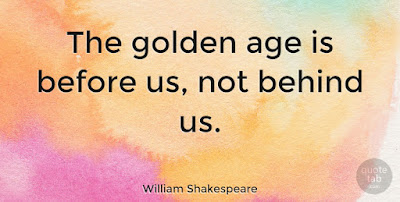The world does not progress-it merely changes
Or
The Golden Age Is Not Behind Us But Before Us
As depicted by Thomas More in his “Utopia”
the Golden Age is the vision of an ideal state which is founded on perfect
equality and liberty, in which there is no religious intolerance, no distinction between the rich and the poor, no racial pride and arrogance, no
tyranny, no oppression, no exploitation, and no injustice. Similarly, Shelley in
his “Prometheus Unbound” pictures the man of the Golden Ages as “sceptreless,
free, uncircumscribed, equal, unclassed, tribeless and cosmopolitan”.
“Hope
springs eternal in the human breast
Man never is but always to
be blest”.
Those
who look for the Golden Age in the future advocate the ideal of progress. They
believe that mankind has been marching on an eternal path of progress, that the
past was good, the present is better and the best is yet to be. This principle of progress which includes a conception of the growth of civilization in the past
and a similar “upward development in the future” developed in 19th a century and was a favourite creed with many a distinguished Victorian thinker,
such as Darwin, Hegal, Spencer, Tennyson, Browning, and many others. Herbert
Spencer declared that “progress is not an accident but a necessity. It is
certain that man must become perfect”. Herschel claimed that “Man’s progress
towards a higher state need never fear a check, but must continue till the very
last existence of history”.
But in
the 20th century, we come across many erudite who disapprove the idea
of progress. Bertrand Russel, Louis Fischer, and many others of equal eminence
conclude that neither there has been progressed in the past, nor should we hope
for progress in the future. Science and morality, art and literature, history
and politics all go to show that progress has been an illusory hope that has
sustained mankind for generations but which ultimately proves merely a myth, a
pure fiction.
The tremendous
advancement of applied science, of great modern discoveries and inventions, has
no doubt added to the material comforts and amenities of life, but with the advent of technological advancements, they have brought grim complications to
the modern man, such as the exploitation of the poor, the conflict of labor and
capital, unhealthy sanitation, and so on. In the name of progress, we have devastated
the peace and loveliness of the world; and have established smoke-ridden cities
and dirty hovels, quite away from the safe heaven of God Almighty.
In the
field of politics there has been more of a decline than progress. Despite, our
great boast of having substituted dictatorship with democracy, we have not been
able to root out imperialism and colonialism to establish lasting world peace.
We have established the U.N. and for securing universal peace and harmony but
the two clashing ideologies of the modern world, the Communist bloc, and the Capitalist
block are contending desperately for the mastery of the world peace’ is still
no better than a fitful gleam. With the clouds of a Third World War gathering
thick on our heads, can we say that there is progress, that the present is
better than the past and that the best is yet to be?
In the
field of literature and fine arts, we admit that great progress was made in
ancient times, but let us not forget that the
art and literature of the old days was more or less a monopoly of upper and ruling
classes, the common people remaining not only are ignorant of them but
completely illiterate and uneducated. Today, it is very different. Education
widespread and thus art and literature have necessarily become broad-based as
well as democratic.
One
cannot deny that the present has many defects and our civilization suffers from
many ills, but we hope that “somehow or other, good will be the final goal of
ill”, that with the true federation of mankind established in the future and a
sufficient measure of justice, social and economic, and equality of opportunity
obtained for all, there would be such a release of human energy for
constructive purposes that the Golden Age will become a reality in the world.
In the
dark clouds enveloping the world we already see a silver lining. Men’s gaze is
turned towards the horizon of peace, harmony, and brotherhood. Humanity is fed
up with wars and conflicts and slowly but steadily marching towards the Golden
Age and realizing its dream of perfection. Let us be, therefore, optimistic
like Shelley and sing:
“The world’s great age
begins anew,
The Golden
years return,
The
earth doth like a snake renew”


